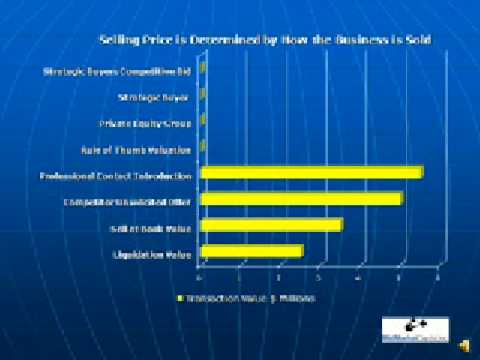
Business Sale Deal Breakers
If you are on the verge of a business sale deal, be careful. There are many slips between the cup and your lips. You should make sure that you toast to a successful deal, and steer clear of the pits and traps that can ruin your hard work and make your business sale deal crash. Most of these business sale deal breakers appear benign and common sense, but you should remember that sometimes common sense can be uncommon. Being aware of these deal breakers will prepare you to better identify and avoid such threatening situations that could blow a business sale deal. So, what are these business sale deal breakers? Let’s take a look at 10 of them.
1. Wrong Data
If the data you furnished to your prospect buyer is bad due to any reason, the impact might hit you when you least expect it. Make sure that you check out all figures and think about the information that you’ve supplied. There might be a temptation to blow up sales figures or show less expenses, but bad data, whether intentional or not, can stall your business sale by making your whole business suspicious in the eyes of the buyer. To avoid this pitfall, be open and straightforward right from the beginning.
2. Claim against your business
If your business or any of its assets have a claim against them, it may sink your prospect of making a sale if you haven’t revealed it in your documents. Even if you have mentioned it in the data, a claim reflects poorly on your business. Try to get rid of the claim before going for a business sale, or have a good justification accompany it when you reveal it in your docs.
3. Cover Up
If you have been sweeping problems under the carpet, it’s time to clean up your act. Get your records straight and get rid of any existing and impending issues that might threaten the business sale. Some of the issues can be outstanding debts, employee turnover, or sales slowing down. Covering them up would do little good, while being honest about them will make you think of ways to resolve such issues.
4. Deal Fixation
This happens when a business owner is too focused on the business sale, which may take months to go through. They ignore normal business activities and revenues dip. When the buyer asks for current data, the deal may go into a nosedive. Always focus on strengthening your business even while you are under the sale process. Making jumps in sales or news headlines while negotiations are underway gives you the advantage. Don’t get fixated on the deal to the extent that you let your business suffer.
5. Lack of Preparedness
Being unable to answer a key question during one of the meetings reflects poorly on you as a business owner. If you don’t know the strengths and weakness of your business accurately, it might also affect your negotiations and selling price. Not being prepared with the information and documents required for the due diligence, and taking too long in preparing them is the best recipe for driving away your buyer.
6. Excitement and Depression
A business sale is a tedious process and has its emotional impacts. You may be excited one day, and depressed the next. Sometimes it might appear that you are about to win the sale on your terms. At others, it might seem like an impossible task. As we all feel stress and emotions, there’s a chance you might say or do something that jeopardises the sale prospects. Don’t let your mood swings take the better of you. Always make decisions with a cool mind.
7. Competition
Although rare, competition can and does wreck business sales. This can happen when you have several other businesses like yours offering to sell. If you anticipate this kind of a situation, you should make sure that you offer the buyer some unique propositions or benefits in order to keep the buyer from getting interested in competing businesses.
8. Laws and Regulations
For overseas business sales, certain ownership or transfer laws may be applicable. There may be laws in your particular industry that spell out the requirements for a business sale. If you and your buyer are not aware of such laws and don’t fulfil the requirements, this may come as a roadblock to your business sale.
9. Scams and Scammers
Some companies may offer you a very lucrative deal for selling your business. Such companies, which may be posing as buyers or solicitors, would ask you for a deposit or upfront payment on any context. Make sure that you check all details about the person or firm that you are dealing with for your business sale. Don’t fall for a scam where you end up losing money or wasting time, or both.
10. Delays
Delays, regardless of their causes, will always have a negative effect on your business-sale proceedings. Don’t let delays happen. You can do this if you have planned your sale well.
Working with an experienced and competent business sale solicitor can save you from many of the pitfalls mentioned above.
Joanna Miller helps business owners navigate their way through the start to finish process of selling a business. Her specialty is helping owners understand how to prepare and make the most of their business sale process to maximise their company’s value. To understand how you can sell your business quickly for the highest sales price, purchase her book, “How To Sell A Business: The #1 guide to maximising your company value and achieving a quick business sale”



 Starting a new business all over again? What about your existing business? There can be many reasons for selling a business. It may be that you have realised that you are in the wrong line of business, and would like to switch industries. Or, you might have realised that your business is not performing as expected, and you would rather sell your business while it’s still making some profits. After all, over 50% of business start ups go under in the first five years. And, if you are lucky, you have a business that’s roaringly successful, and you would like to cash in the good will and start up a new business.
Starting a new business all over again? What about your existing business? There can be many reasons for selling a business. It may be that you have realised that you are in the wrong line of business, and would like to switch industries. Or, you might have realised that your business is not performing as expected, and you would rather sell your business while it’s still making some profits. After all, over 50% of business start ups go under in the first five years. And, if you are lucky, you have a business that’s roaringly successful, and you would like to cash in the good will and start up a new business.





